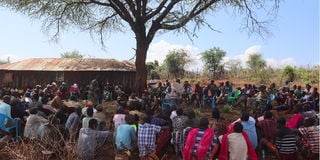Premium
Hope for peace as Marsabit morans pledge to stop cattle theft

Rendille and Samburu morans during a meeting with the government administrators at Kituruni Location in Marsabit County on November 19, 2022.They vowed to stop cattle raids.
Warriors from communities in Marsabit have vowed to join hands and stem cattle theft, which is blamed for persistent insecurity in the border county.
Speaking in Kituruni location during a peace meeting, morans from the Rendile and Samburu communities asserted their commitment to ending cattle raids.
Speaking on behalf of the warriors, Francis Basele said they were committed to working with security agencies and peace stakeholders to prevent human deaths and destruction caused by the practice.
“It’s indeed a novel idea for the provincial administration and stakeholders such as the Northern Rangeland Trust (NRT) to reach out to us, morans, in the grazing fields. We want to say we are committed to helping them stave off cattle raiding in this county,” Mr Basele said.
He also vowed that never again will they host or condone the acts of bandits from Samburu who raid homesteads in Marsabit and leave the neighbouring communities fighting against each other.
Mzee Issack Dokhle, who represented the elderly, condemned the livestock raiding practices that had become more frequent, violent, and destructive.
He said cattle rustling is an outdated cultural practice that should be shunned by pastoral communities at any cost.
Conflicts related to livestock raiding have been a common phenomenon among pastoral communities in Northern Kenya, especially in Marsabit.
Traditionally, such communities raid homesteads to restock their herds, especially after periods of drought and disease outbreaks or for young men to get enough animals to pay dowry or to increase their wealth.
Marsabit Deputy County Commissioner David Saruni detailed how cattle raiding had become lethal and continued to drive a wedge among neighbouring pastoral communities.
Over the years, these violent conflicts have posed a significant threat to pastoral livelihoods that are already under pressure from recurrent drought, diseases and political marginalisation.

Rendille Elder Mzee Issack Dokhle during a peace meeting at Kituruni Location in Marsabit County on November 19,2022. He called on community warriors to abandon cattle raids terming it outdated and retrogressive.
The direct impact of violent raiding is felt in human deaths and loss of property, reduction in livestock numbers, limited access to water and pasture and forced migration.
On the flip side, violent conflicts create a strong and ever-present sense of insecurity, which results in ineffective resource utilisation, reduced mobility, food insecurity, and closure of markets and schools.
Mr Saruni hailed peacebuilding strategies recently deployed by the Northern Rangeland Trust (NRT) to reach out to morans in grazing fields because they were the lot blamed for perpetrating the vice.
NRT Marsabit County Director Dido Fay, for his part, explained that they were committed to changing the local communities’ mindsets to practise pastoralism with zero violence.
He appealed to the government to fast-track its pledge to return guns taken from national police reservists so as to help enhance communal policing strategies.
The meeting came three days after three herders were killed in Segel location, Marsabit Central, when conflicts erupted between Rendille and Gabbra herders.
Speaking at a parallel meeting in Segel, Marsabit Senator Mohammed Chute blamed persistent cattle raiding on Samburu raiders.
He said Marsabit communities were drought-hit and had no business perpetrating violence in the county.
“We have learned that the pastoral communities in Marsabit are no longer interested in perpetrating cattle raiding, especially during these hard times when the drought is biting. Our biggest headache is the bandits from Samburu County who encroach on our counties and leave us fighting,” Mr Chute said.





